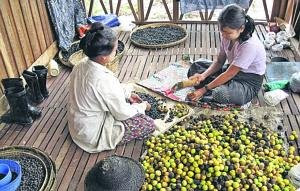
Jatropha, a plant that is native to Central America and grown in countries throughout Asia such as India, China, Indonesia and Myanmar. Could be the rising star as biofuel replacing the crude oil that we are using now.
Jatropha is a resilient plant. It is resistant to drought and pests attack. It produces seeds that can produce yield of up to 40% oil. When the seeds are crushed and processed, the resulting oil can be used in a standard diesel engine.
Myanmar can produce up to six million barrels of crude oil annually. At current stage it is not enough to meet domestic demand thus forcing them to spend more than US$200 million (S$302 million) a year on diesel and crude oil imports. But this could change when the production increases.
Comparing with other feedstocks, Jatropha when used in diesel engines will emits less carbon emissions thus making it a good alternative to diesel.
Jatropha's oil yield is said to be 2,000 litres per ha, against rapeseed's 1,200 litres and soybean's 600 litres.
Although, palm oil yields is higher, at 4,500 litres per ha but it is less sustainable and suitable cos it is a food crop and competes for arable land, at times leading to deforestation.
In terms of breakeven costs jatropha is by far the most efficient biofuel at US$50 per barrel. It trumps other traditional feedstocks such as palm oil (US$149) rapeseed (US$190) and soybean (US$144).
Let's see how jatropha will develop to become the champion of biofuels in the 21st century









0 comments
Post a Comment